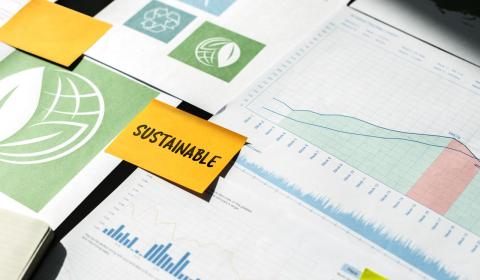
How new regulation will impact sustainability reporting from 2022
Businesses today are under more scrutiny than ever before. Internal and external stakeholders of all kinds – from investors to clients and consumers – along with governments and international organizations, are increasingly vigilant regarding companies’ practices. This also goes for those of the suppliers and partners they use. More and more, organizations are expected to demonstrate complete transparency and communicate their sustainability impacts to both public and private entities.
Now, with sustainability reporting regulations set to tighten in 2022, it is important for companies to understand what is at stake and how they can ensure their data is reliable and accurate.
Sustainability reporting: what’s at stake for stakeholders?
Many large organizations have been publishing sustainability data and reports for several years. Indeed, the number of companies filing reports that use Global Reporting Initiative (GRI) sustainability reporting framework of standards has increased a hundredfold since 2000[1]. Reports may go under the title of corporate sustainability responsibility (CSR), corporate responsibility (CR) or environmental, and social governance (ESG), but they share a common ambition: to provide a transparent view of a company’s non-financial data and practices.
Sustainability reporting is increasingly important for investors and civil society organizations who now require more and better information from companies about their impact. It also encourages companies to develop a more responsible approach to how they do business by obliging them to consider their impacts on sustainability issues. However, stakeholders today are no longer willing to take companies at their word: there is a global call for standardization and regulation of non-financial reporting. Verified reporting enables stakeholders to evaluate the non-financial performance of large companies. It requires that organizations provide tangible, credible demonstrations of their level of sustainability by following proper guidelines for sustainability reporting. Accuracy and transparency are of the essence.
Keeping reports up to standard
The growing importance of sustainability reporting is reflected in the increasing number and stringency of regulations. Currently, the European Union Non-Financial Reporting Directive (NFRD) requires large public-interest companies with more than 500 employees to disclose information on their operations and management of social and environmental challenges. However, in April 2021, the Commission adopted a proposal for a new Corporate Sustainability Reporting Directive (CSRD), which will come into force in October 2022.
The CSRD extends the scope of the NFRD to include all companies with over 250 employees, plus those with over 10 employees which are listed on regulated markets (except listed micro-enterprises). It makes the assurance of reported information obligatory and introduces more detailed reporting requirements, including a requirement to report according to mandatory EU sustainability reporting standards. The CSRD also obliges companies to ‘tag’ all reported information digitally, so that it is machine readable and feeds into the European single access point envisaged in the capital markets union action plan.
This legislation is part of an ambitious and comprehensive package of measures that aim to improve the flow of capital towards sustainable activities across the EU. By enabling investors to direct their money towards sustainable technologies and businesses, it is thought that these measures will be instrumental in making Europe climate neutral by 2050.
Be prepared!
Companies have the best part of 2022 to prepare for the new law, and it is important that they do so thoroughly. If they are to publish accurate, reliable reports, there are a number of questions companies need to ask themselves sooner, rather than later. Those who are already reporting and assuring their sustainability data are in a stronger position than those who are not, but no company has all the answers. The EU has communicated that the specific unified European reporting standards will be aligned to existing reporting frameworks and requirements. However, the first batch is not expected to be published until October 2022, with the second coming in October 2023.
First, reporting companies need to assess the reliability of their data and the accuracy of their statements. Then, the key question is what they can do to improve the transparency of their reporting and build trust among stakeholders.
To address these questions, and in particular to assess whether their sustainability data is reliable, companies should start working with a reputable third party now. This will prepare them for the pressures the additional scrutiny creates and empower them to drive improvements thanks to objective expert feedback.
How Bureau Veritas can help
Bureau Veritas Certification provides independent report assurance services to help companies prove the reliability and accuracy of their sustainability claims. Ours is a world-renowned and trusted stamp of approval, which confirms the credibility of CSR and sustainability data produced by companies.
Beyond verifying data, Bureau Veritas report assurance also enables companies to demonstrate best practices in sustainability reporting, giving a complete overview of their impacts. We assess sustainability reports to a number of international standards and frameworks:
- AccountAbility’s three AA1000 standards combine to form a principles-based assurance framework that holds companies accountable for sustainability management, performance and reporting.
- The International Standard on Assurance Engagements (ISAE) 3000 sets the standard for assurance of non-financial information and includes guidelines for ethical behavior, quality management and performance.
- The Sustainability Accounting Standard Board has 77 globally applicable industry-specific standards that enable businesses to identify, manage and communicate financially material sustainability information.
- The Global Reporting Initiative’s (GRI) framework provides a complete picture of a business’ sustainability impacts.
Demonstrating excellence through robust, comprehensive and transparent reporting already offers companies a significant competitive advantage, and soon it will become a legal requirement. Report assurance with a trusted partner like Bureau Veritas enables organizations to remain compliant, boost their sustainability credentials, and send a powerful message to stakeholders about their commitment to responsible business practices.
Want to find out more about our sustainability report assurance services? Learn more
[1] Source : https://hbr.org/2021/05/overselling-sustainability-reporting


